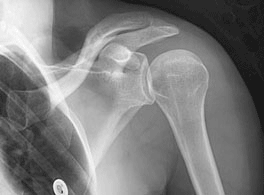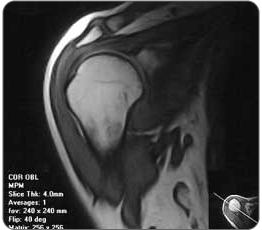|
| Diagnosing Adhesive Capsulitis/Frozen Shoulder/Locked Shoulder To help your doctor or orthopedic surgeon achieve a proper diagnosis, he/she will begin with a medical history about you, your current condition and symptoms. He/she will inquire about the intensity of your present pain, the duration of your symptoms and the limitations you are experiencing. Details about what instigated the problem, when it started, and whether or not you have ever had treatments for this or a similar condition in the past, are very helpful in assessing your injury. A physical examination will be performed to determine if you have any signs of adhesive capsulitis or other shoulder injury. Your doctor will visually assess and press on the bones and soft tissue in both your shoulders to evaluate sameness (symmetry) and recognize differences. This will identify any abnormalities, such as mild or severe inflammation, tenderness, fluid, bone or tissue deformity, weakened muscles, redness and/or warmth on the skin. He/she may ask you to complete a series of arm movements, such as raising your arms to the front, back and side, to measure your range of motion and see what causes pain and tightness. Some of these will be performed by you and others will be performed by the doctor. Generally you will not be able to move your arm in any direction at all (or just slightly) if you have adhesive capsulitis - whether you try to move it or your doctor tries to move it. If you have movement when your doctor moves your arm, you may be tested for other shoulder conditions. Most Common Shoulder Diagnostic Tests: Diagnostic tests will often help to obtain more detailed information about your shoulder condition.
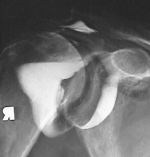 Arthrogram contrasts are special x-rays that show details of the shoulder capsule, such as a decrease in size (in a normal shoulder the capsule is rounded, but in a frozen shoulder the capsule is squat, square and contracted). Blood testing can be done if the doctor suspects the primary reason for your frozen shoulder is a result of a systemic disorder In addition to using Ice Packs for swelling and pain minimization, we also recommend Circulation Boost via the Shoulder TShellz Wrap® - another innovative pain relief device from MendMeShop - this wrap will gently heat and increase blood flow to the treated area. REMEMBER: If your shoulder is injured and you continue to strain it through exercise, rigid and solid scar tissue will grow in the joint. This will cause shoulder movement to ALWAYS hurt, during ANY exercise. The growth of scar tissue is NOT GOOD, so if you're suffering from a shoulder injury, it's important to treat it and heal as fast as possible. If you suffer from mild inflammation or pain after certain activities or movements use a Cold Compress or Ice Pack when you complete the activity and then rest and elevate your shoulder. Limit the application of cold to a couple of treatments per day. If you have been given a treatment plan by your health professional, make sure you adhere to it to ensure pain free living. In general, people who are committed to their treatments and exercises will have the best medical outcomes. Product Advisors are available 9:00 am to 5:00 pm Eastern Standard Time Monday to Friday. Living with pain is never easy and we encourage you to call us with any questions you have related to your frozen shoulder. We will do our best to help. Learn More About Shoulder Injuries & TreatmentsI want to learn more about Frozen Shoulder Causes. I want to learn more about TShellz Wrap® Circulatory Boost I want to learn more about Ice & Heat: Which Is Better For Treatment? I want to learn more about Trigger Points. I want to learn more about Frozen Shoulder Manipulation. I want to learn more about Post Surgery Recovery? FREE SHIPPING ON ALL PRODUCTS CURRENTLY ENABLED |
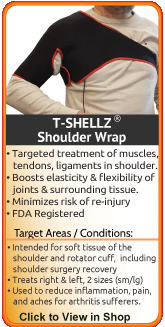 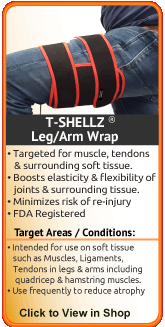  |
